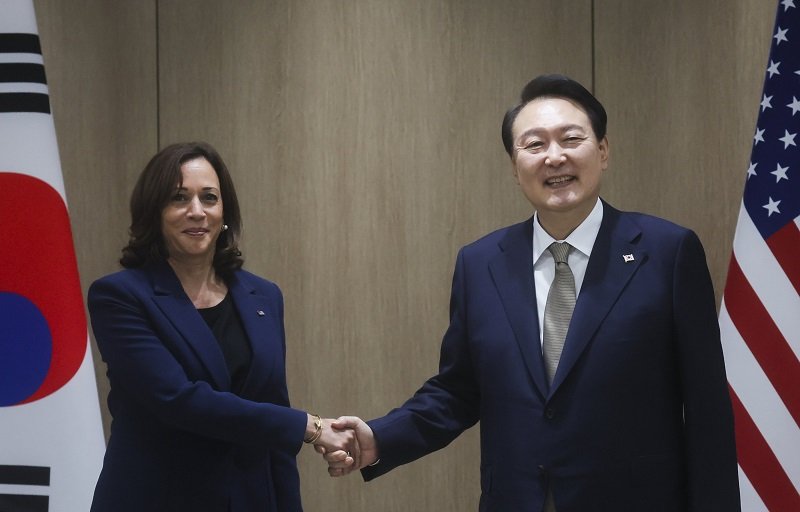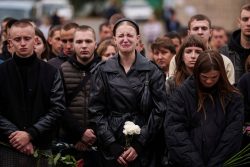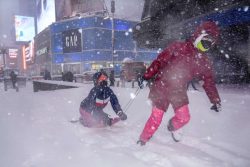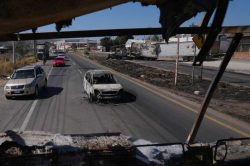
U.S. Vice President Kamala Harris, left, and South Korea’s President Yoon Suk Yeol pose for a photo as they hold a bilateral meeting in Seoul Thursday, Sept. 29, 2022.
17:49 JST, September 29, 2022
PANMUNJOM, Korea (AP) — U.S. Vice President Kamala Harris capped her four-day trip to Asia with a stop Thursday at the Demilitarized Zone dividing the Korean Peninsula as she emphasized U.S. commitment to the security of its Asian allies in the face of an increasingly aggressive North Korea.
The visit comes on the heels of North Korea’s latest missile launches and amid fears that the country may conduct a nuclear test. Visiting the DMZ has become something of a ritual for American leaders hoping to show their resolve to stand firm against aggression.
North Korea fired two short-range ballistic missiles on Wednesday, while Harris was in Japan, and had fired one before she left Washington on Sunday. The launches contribute to a record level of missile testing this year that is intended to move Pyongyang closer to being acknowledged as a full-fledged nuclear power.
At the DMZ, Harris went to the top of a ridge, near guard towers and security cameras. She looked through bulky binoculars as a South Korean colonel pointed out military installations on the southern side. Then an American colonel pointed out some of the defenses along the military demarcation line, including fence topped with barbed wire and claymore mines. He said American soldiers regularly walk patrols along a path.
“It’s so close,” Harris said.
Her visit to the observation post came after she met U.S. service members and some of their relatives at the Camp Bonifas Dining Facility, where she said she wanted them to know “how grateful and thankful we are.”
“I know it’s not always easy. Most of the time it’s not,” she said.
She asked a soldier from Florida on whether he checked in on his family after Hurricane Ian.
“Yeah, they’re up on a hill,” he said.
When another soldier stammered nervously while introducing himself, Harris said, “You know your name!”
“They’re going to give you such a hard time when this is over,” she joked.
Earlier, Harris met with South Korean President Yoon Suk Yeol at his office in Seoul where they condemned North Korea’s intensifying weapons tests and reaffirmed the U.S. commitment to defend the South with a full range of its military capabilities in the event of war, Yoon’s office said.
They expressed concern over North Korea’s threats of nuclear conflict and pledged an unspecified stronger response to major North Korean provocations, including a nuclear test, which South Korean officials say could possibly take place in coming months.
Harris and Yoon were also expected to discuss expanding economic and technology partnerships and repairing recently strained ties between Seoul and Tokyo to strengthen their trilateral cooperation with Washington in the region.
Yoon tweeted that he had a “very productive discussion” with Harris on strengthening their bilateral alliance.
Harris’ trip was organized so she could attend the state funeral of former Japanese Prime Minister Shinzo Abe, but her itinerary was dominated by security concerns, a reflection of fears about China’s growing power and North Korea’s ramped-up testing activity.
In every meeting, Harris tried to lay to rest any fears that the United States was wavering in its commitment to protect its allies, describing American partnerships with South Korea and Japan as the “linchpin” and “cornerstone” of its defense strategy in Asia.
Yoon, who took office earlier this year, had anchored his election campaign with vows to deepen Seoul’s economic and security partnership with Washington to navigate challenges posed by the North Korean threat and address potential supply chain risks caused by the pandemic, the U.S.-China rivalry and Russia’s war on Ukraine. But the alliance has been marked by tension recently.
South Koreans have expressed a sense of betrayal over a new law signed by President Joe Biden that prevents electric cars built outside of North America from being eligible for U.S. government subsidies, undermining the competitiveness of automakers like Seoul-based Hyundai.
During their meeting, Harris told Yoon that the Biden administration will continue to consult with Seoul and try to address South Korean concerns as the law is implemented, Yoon’s office said.
Scott Snyder, a senior fellow for Korea studies at the Council on Foreign Relations, said the dispute over electric vehicles has swiftly become a firestorm that U.S. officials cannot ignore, although there may not be a simple solution.
“It’s taking on a level of urgency that’s making it into a political problem that requires management,” Snyder said. “I don’t know that it’s going to be easy for the Biden administration to do that.”
Ilaria Mazzocco, a fellow at the Center for Strategic and International Studies, said it’s a question of whether the Inflation Reduction Act was intended to create American jobs or move supply chains out of China — “onshoring” versus “friendshoring.”
“It’s very tricky for U.S. policymakers. It’s tough to sell to voters that the U.S. is stronger when partner countries are stronger. But that’s the truth,” she said.
After meeting Yoon, Harris, the first woman to serve as U.S. vice president, held a roundtable with female leaders in business, media, culture and sports on gender equity issues.
Yoon has faced criticism for the lack of female representation in government and his downplaying of broader inequalities. He claimed during his campaign that South Korea no longer has any structural barriers to women’s success, which experts say ignored the country’s large gender pay gaps and the underrepresentation of women in corporate board rooms and politics.
“If we want to strengthen democracy, we must pay attention to gender equity,” said Harris, who acknowledged that she raised the issue with Yoon. Yoon’s office didn’t immediately confirm such conversations.
As they did at her meetings in Japan, however, regional security issues dominated the final day of Harris’ trip.
There are indications North Korea may up its weapons demonstrations soon as it refines its missiles and delivery systems and attempts to pressure Washington to accept the North as a nuclear power. South Korean officials said last week that they detected signs North Korea was preparing to test a ballistic missile system designed to be fired from submarines.
The U.S. aircraft carrier USS Ronald Reagan was to train with South Korean and Japanese warships in waters near the Korean Peninsula on Friday in the countries’ first trilateral anti-submarine exercises since 2017 to counter North Korean submarine threats, South Korea’s navy said Thursday.
U.S. and South Korean officials also say North Korea is possibly gearing up for its first nuclear test since 2017. That test could come after China holds its Communist Party convention the week of Oct. 16, but before the United States holds its midterm elections Nov. 8, according to South Korean lawmakers who attended a closed-door briefing from the National Intelligence Service.
North Korea has punctuated its testing activity with repeated threats of nuclear conflict. Pyongyang’s rubber-stamp parliament this month authorized the preemptive use of nuclear weapons in a broad range of scenarios where its leadership comes under threat.
Some South Koreans have expressed interest in the redeployment of U.S. tactical nuclear weapons after their removal from South Korea in the 1990s and even for the country to pursue its own nuclear weapons program.
Yoon, during a news conference in August, said his government had no plans to pursues its own deterrent and called for North Korea to return to nuclear diplomacy, which imploded in 2019 over disagreements on exchanging the release of crippling U.S.-led sanctions against the North and the North’s disarmament steps.
Top Articles in News Services
-

Survey Shows False Election Info Perceived as True
-

Hong Kong Ex-Publisher Jimmy Lai’s Sentence Raises International Outcry as China Defends It
-

Japan’s Nikkei Stock Average Touches 58,000 as Yen, Jgbs Rally on Election Fallout (UPDATE 1)
-

Japan’s Nikkei Stock Average Falls as US-Iran Tensions Unsettle Investors (UPDATE 1)
-

Trump Names Former Federal Reserve Governor Warsh as the Next Fed Chair, Replacing Powell
JN ACCESS RANKING
-

Producer Behind Pop Group XG Arrested for Cocaine Possession
-

Japan PM Takaichi’s Cabinet Resigns en Masse
-

Japan Institute to Use Domestic Commercial Optical Lattice Clock to Set Japan Standard Time
-

Man Infected with Measles Reportedly Dined at Restaurant in Tokyo Station
-

Israeli Ambassador to Japan Speaks about Japan’s Role in the Reconstruction of Gaza






















